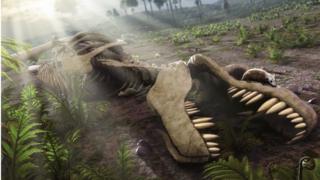Old Rocks
Diamond Member
I wonder if there are similiar structures in scales?
Scientists Offer More Evidence on What Dinosaurs Looked Like - NYTimes.com
Until last week, paleontologists could offer no clear-cut evidence for the color of dinosaurs. Then researchers provided evidence that a dinosaur called Sinosauropteryx had a white-and-ginger striped tail. And now a team of paleontologists has published a full-body portrait of another dinosaur, in striking plumage that would have delighted that great painter of birds John James Audubon.
Scientists Offer More Evidence on What Dinosaurs Looked Like - NYTimes.com
Until last week, paleontologists could offer no clear-cut evidence for the color of dinosaurs. Then researchers provided evidence that a dinosaur called Sinosauropteryx had a white-and-ginger striped tail. And now a team of paleontologists has published a full-body portrait of another dinosaur, in striking plumage that would have delighted that great painter of birds John James Audubon.
